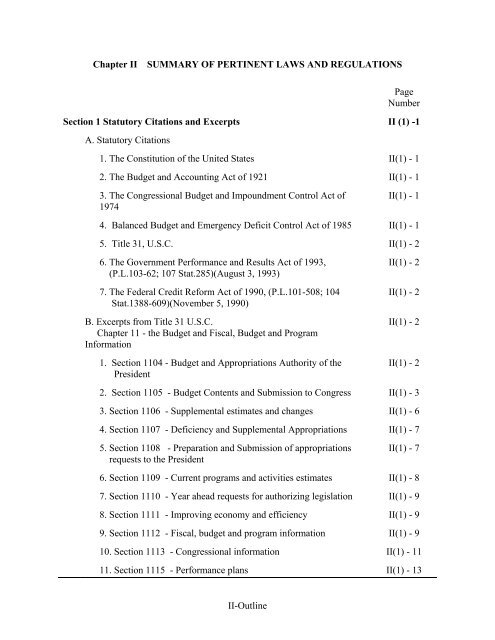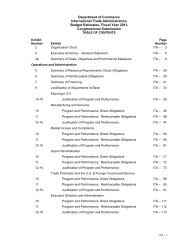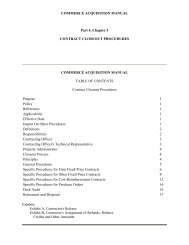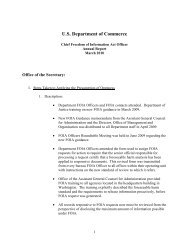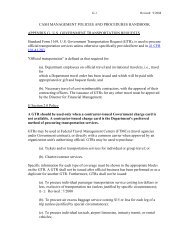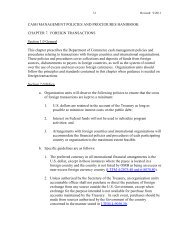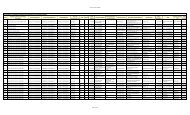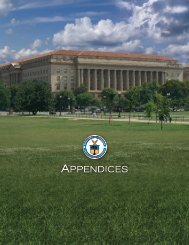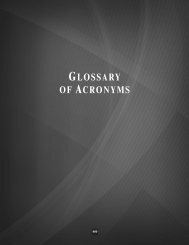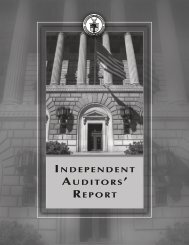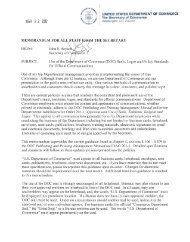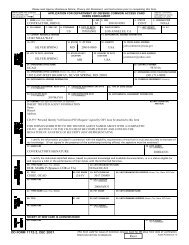Chapter II SUMMARY OF PERTINENT LAWS AND REGULATIONS
Chapter II SUMMARY OF PERTINENT LAWS AND REGULATIONS
Chapter II SUMMARY OF PERTINENT LAWS AND REGULATIONS
You also want an ePaper? Increase the reach of your titles
YUMPU automatically turns print PDFs into web optimized ePapers that Google loves.
<strong>Chapter</strong> <strong>II</strong> <strong>SUMMARY</strong> <strong>OF</strong> <strong>PERTINENT</strong> <strong>LAWS</strong> <strong>AND</strong> <strong>REGULATIONS</strong>PageNumberSection 1 Statutory Citations and Excerpts <strong>II</strong> (1) -1A. Statutory Citations1. The Constitution of the United States <strong>II</strong>(1) - 12. The Budget and Accounting Act of 1921 <strong>II</strong>(1) - 13. The Congressional Budget and Impoundment Control Act of1974<strong>II</strong>(1) - 14. Balanced Budget and Emergency Deficit Control Act of 1985 <strong>II</strong>(1) - 15. Title 31, U.S.C. <strong>II</strong>(1) - 26. The Government Performance and Results Act of 1993,(P.L.103-62; 107 Stat.285)(August 3, 1993)7. The Federal Credit Reform Act of 1990, (P.L.101-508; 104Stat.1388-609)(November 5, 1990)B. Excerpts from Title 31 U.S.C.<strong>Chapter</strong> 11 - the Budget and Fiscal, Budget and ProgramInformation1. Section 1104 - Budget and Appropriations Authority of thePresident<strong>II</strong>(1) - 2<strong>II</strong>(1) - 2<strong>II</strong>(1) - 2<strong>II</strong>(1) - 22. Section 1105 - Budget Contents and Submission to Congress <strong>II</strong>(1) - 33. Section 1106 - Supplemental estimates and changes <strong>II</strong>(1) - 64. Section 1107 - Deficiency and Supplemental Appropriations <strong>II</strong>(1) - 75. Section 1108 - Preparation and Submission of appropriationsrequests to the President<strong>II</strong>(1) - 76. Section 1109 - Current programs and activities estimates <strong>II</strong>(1) - 87. Section 1110 - Year ahead requests for authorizing legislation <strong>II</strong>(1) - 98. Section 1111 - Improving economy and efficiency <strong>II</strong>(1) - 99. Section 1112 - Fiscal, budget and program information <strong>II</strong>(1) - 910. Section 1113 - Congressional information <strong>II</strong>(1) - 1111. Section 1115 - Performance plans <strong>II</strong>(1) - 13<strong>II</strong>-Outline
12. Section 1116 - Program performance plans <strong>II</strong>(1)- 15<strong>Chapter</strong> 13 - Appropriations13. Section 1301 - Application <strong>II</strong> (1) - 1614. Section 1341 - Limitations on expending and obligatingamounts<strong>II</strong> (1) - 17<strong>Chapter</strong> 15 - Appropriation Accounting15. Section 1512 - Apportionment and reserves <strong>II</strong> (1) - 1816. Section 1514 - Administrative division of apportionments <strong>II</strong> (1) - 1917. Section 1515 - Authorized apportionments necessitatingdeficiency or supplemental appropriations<strong>II</strong> (1) - 1918. Section 1516 - Exemptions <strong>II</strong> (1) - 2019. Section 1517 - Prohibited obligations and expenditures <strong>II</strong> (1) - 2020. Section 1518 - Adverse personnel actions <strong>II</strong> (1) - 2121. Section 1519 - Criminal penalty <strong>II</strong> (1) - 21Section 2 Administrative Rules and Regulations <strong>II</strong> (2) - 1A. OMB Circulars and GAO Documents <strong>II</strong> (2) - 11. OMB Circular A-11 <strong>II</strong> (2) - 12. OMB Circular A-19 <strong>II</strong> (2) - 13. Other selected OMB Circulars-34 <strong>II</strong> (2) - 14. General Accounting Office (GAO) <strong>II</strong> (2) - 1B. Annual Reports and Documents <strong>II</strong>(2) - 1Section 3 House and Senate Authorization and Appropriation Rules <strong>II</strong>(3)-1A. Authorization Rules <strong>II</strong> (3)- 11. House of Representatives <strong>II</strong> (3)- 12. Senate <strong>II</strong> (3)- 3B. Appropriations Rules and Precedents <strong>II</strong> (3)- 41. House Rules <strong>II</strong> (3) - 42. Senate Rules <strong>II</strong> (3) - 5Section 4 Policies Governing the release of Budgetary Information <strong>II</strong> (4) - 1<strong>II</strong>-Outline
<strong>Chapter</strong> <strong>II</strong> <strong>SUMMARY</strong> <strong>OF</strong> <strong>PERTINENT</strong> <strong>LAWS</strong> <strong>AND</strong> <strong>REGULATIONS</strong>Section 1 Statutory Citations and ExcerptsA. Statutory Citations1. The Constitution of the United States, Article IThe "power of the purse" is a legislative power. The Constitution lists the powerto lay and collect taxes (section 8) as one of the powers of Congress and providesthat funds may be drawn from the Treasury only pursuant to appropriations madeby law (section 9). Neither the Constitution nor the procedures subsequentlydeveloped by the House and Senate provided for a budget system.2. The Budget and Accounting Act of 1921 (P.L. 67-13; 42 Stat. 20) (June 10, 1921)This Act established an executive budget process; it did not directly alter theprocedures by which Congress makes revenue and spending decisions. ThePresident was required to submit his budget recommendations to Congress eachyear, and the Bureau of the Budget (renamed the Office of Management andBudget (OMB) in 1970) was created to assist him in carrying out his budgetaryresponsibilities. The 1921 Act also established the General Accounting Office(GAO) as the principal auditing arm of the Federal Government. The Budget andAccounting Act of 1921, as amended, remains the statutory basis for thePresidential budget system.3. The Congressional Budget and Impoundment Control Act of 1974, (P.L. 93-344;88 Stat. 297) (July 12, 1974)This Act established a Congressional budget process centered around a"concurrent resolution on the budget", scheduled for adoption prior to legislativeconsideration of revenue or spending bills. The central purpose of the processestablished by the Act is to coordinate the various revenue and spending decisionswhich are made in separate tax, appropriation, and legislative measures. To assistCongress in making budget decisions, the 1974 Budget Act established theCongressional Budget Office (CBO). During the years that the Congressionalbudget process has been in operation, its procedures have been adapted byCongress to changing circumstances.4. Balanced Budget and Emergency Deficit Control Act of 1985, P.L. 99-177; 99Stat. 1037) (December 12, 1985)This Act is commonly referred to as the Gramm-Rudman-Hollings Act.Following a decade of experience with the 1974 Budget Act, Congress enactedthis legislation to make a number of changes in the budget process. These laws<strong>II</strong>(1)-1
are codified at 2 U.S.C. SS601, et. seq., and SS901, et. seq.Gramm-Rudman-Hollings was supplemented and extended by enactment of theBalanced Budget and Emergency Deficit Control Reaffirmation Act of 1987.(P.L. 100-119; 101 Stat. 754) (September 29, 1987), the Budget ReconciliationAct of 1990 (P.L. 101-508, Title X<strong>II</strong>I; 104 Stat. 1388-608) (November 5, 1990),and most recently, the Budget Enforcement Act of 1997 (P.L.105 -33, Title X;111 Stat.667)(August 5, 1997).5. Title 31, U.S. Code - Money and FinanceThis legislation codifies and consolidates laws applicable to the budget process,e.g., the budget system, budgetary and fiscal information, appropriations,apportionments and accounting, including the requirements of the AntideficiencyAct which prohibit obligations or expenditure of funds in excess of amountsappropriated by law.6. The Government Performance and Results Act of 1993, (P.L.103-62; 107Stat.285)(August 3, 1993)This Act, commonly referred to as GPRA or the Results Act, requires that Federalagencies develop and implement an accountability system based on performancemeasurement, including setting goals and objectives and measuring progresstoward achieving them. To this end, agencies must provide strategic plans, annualperformance plans, and annual program performance reports to show what isbeing accomplished with their budgetary resources.7. The Federal Credit Reform Act of 1990, (P.L.101-508; 104 Stat.1388-609)(November 5, 1990)This Act instituted reforms in Federal credit programs that changed the budgetarymeasurement of direct loan and loan guarantee costs. The intent of this Act is toensure that the cost of Federal loan programs are measured accurately as possible,so that these costs can be taken into account in making budgetary decisions.B. Excerpts from Title 31 U.S.C.The following excerpts from Title 31 are particularly relevant for budget formulation andexecution.<strong>Chapter</strong> 11 The Budget and Fiscal, Budget, and Program Information1. Section 1104 - Budget and appropriations authority of the President(a)The President shall prepare budgets of the United States Governmentunder section 1105 of this title and propose deficiency and supplementalappropriations under section 1107 of this title. To the extent practicable,the President shall use uniform terms in stating the purposes and<strong>II</strong>(1)-2
conditions of appropriations.(b)(c)(d).(e)Except as provided in this chapter, the President shall prescribe thecontents and order of statements in the budget on expenditures andestimated expenditures and statements on proposed appropriations.The President shall include with the budget and proposed appropriationsinformation on personnel and other objects of expenditure in the way thatinformation was included in the budget for fiscal year 1950. However, therequirement that information be included in the budget in that way may bewaived or changed by joint action of the Committees on Appropriations ofboth Houses of Congress. This subsection does not limit the authority of acommittee of Congress to request information in a form it prescribes.When the President makes a basic change in the form of the budget, thePresident shall submit with the budget information showing where itemsin the budget for the prior fiscal year are contained in the present budget.However, the President may change the functional categories in the budgetonly in consultation with the Committees on Appropriations and on theBudget of both Houses of Congress. Committees of the House ofRepresentatives and Senate shall receive prompt notification of all suchchanges.The President shall develop programs and prescribe regulations toimprove the compilation, analysis, publication, and dissemination ofstatistical information by executive agencies. The President shall carryout this subsection through the Administrator for the Office of Informationand Regulatory Affairs in the Office of Management and Budget.Under regulations prescribed by the President, each agency shall provideinformation required by the President in carrying out this chapter. ThePresident has access to, and may inspect, records of an agency to obtaininformation.2. Section 1105 - Budget contents and submission to Congress(a)On or before the first Monday in February of each year, the President shallsubmit a budget of the United States Government for the following fiscalyear. Each budget shall include a budget message and summary andsupporting information. The President shall include in each budget thefollowing:(1) information on activities and functions of the Government;(2) when practicable, information on costs and achievements ofGovernment programs;(3) other desirable classifications of information;<strong>II</strong>(1)-3
(4) a reconciliation of the summary information on expenditures withproposed appropriations;(5) except as provided in subsection (b) of this section, estimatedexpenditures and proposed appropriations the President decides arenecessary to support the Government in the fiscal year for whichthe budget is submitted and the 4 fiscal years after that year;(6) estimated receipts of the Government in the fiscal year for whichthe budget is submitted and the 4 fiscal years after that year under:(A)(B)laws in effect when the budget is submitted; andproposals in the budget to increase revenues;(7) appropriations, expenditures, and receipts of the Government inthe prior fiscal year;(8) estimated expenditures and receipts, and appropriations andproposed appropriations, of the Government for the current fiscalyear;(9) balanced statements of the:(A)(B)(C)condition of the Treasury at the end of the prior fiscal year;estimated condition of the Treasury at the end of thecurrent fiscal year; andestimated condition of the Treasury at the end of the fiscalyear for which the budget is submitted if financialproposals in the budget are adopted;(10) essential information about the debt of the Government;(11) other financial information the President decides is desirable toexplain in practicable detail the financial condition of theGovernment;(12) for each proposal in the budget for legislation that would establishor expand a Government activity or function, a table showing:<strong>II</strong>(1)-4
(A)(B)the amount proposed in the budget for appropriations andfor expenditures because of the proposal in the fiscal yearfor which the budget is submitted; andthe estimated appropriations required because of theproposal for each of the 4 fiscal years after that year thatthe proposal will be in effect;(13) an allowance for additional estimated expenditures and proposedappropriations for the fiscal year for which the budget issubmitted;(14) an allowance for unanticipated uncontrollable expenditures for thatyear;(15) a separate statement on each of the items referred to in Section301(a)(1)-(5) of the Congressional Budget Act of 1974 (2 U.S.C.632(a)(1)-(5)); and(16) the level of tax expenditures under existing law in the taxexpenditures budget (as defined in section 3(a)(3)) of theCongressional Budget Act of 1974 (2 U.S.C. 622(a)(3)) for thefiscal year for which the budget is submitted, considering projectedeconomic factors and changes in the existing levels based onproposals in the budget.(Subsections (a)(17)-(33) provide further details on specificinformation requirements. Subsection (b) discusses budgetrequests for the legislative and judicial branches.)(b)(c)The President shall recommend in the budget appropriate action to meetan estimated deficiency when the estimated receipts for the fiscal year forwhich the budget is submitted (under laws in effect when the budget issubmitted) and the estimated amounts in the Treasury at the end of thecurrent fiscal year available for expenditure in the year for which thebudget is submitted, are less than the estimated expenditures for that year.The President shall make recommendations required by the public interestwhen the estimated receipts and estimated amounts in the Treasury aremore than the estimated expenditures.When the President submits a budget or supporting information about abudget, the President shall include a statement on all changes about thecurrent fiscal year that were made before the budget or information wassubmitted.(Requirements for information on capital investment (subsection (e)) andcompliance with maximum deficit amounts (subsection (f)) were added by<strong>II</strong>(1)-5
the Balanced Budget and Emergency Deficit Control Act of 1985 (G-R-HI) and amended by the Balanced Budget and Emergency Deficit ControlReaffirmation Act of 1987 (G-R-H <strong>II</strong>)).3. Section 1106 - Supplemental budget estimates and changes(a)Before July 16 of each year, the President shall submit to Congress asupplemental summary of the budget for the fiscal year for which thebudget is submitted under section 1105(a) of this title. The summary shallinclude:(1) for that fiscal year:(A)(B)(C)(D)substantial changes in or reappraisals of estimates ofexpenditures and receipts;substantial obligations imposed on the budget after itssubmission;current information on matters referred to in Section1105(a)(8) and (9)(B) and (C) of this title; andadditional information the President decides is advisable toprovide Congress with complete and current estimates ofthe functions, obligations, requirements, and financialcondition of the United States Government;(2) for the 4 fiscal years following the fiscal year for which the budgetis submitted, information on estimated expenditures for programsauthorized to continue in future years, or that are consideredmandatory, under law; and(3) for future fiscal years, information on estimated expenditures ofbalances carried over from the fiscal year for which the budget issubmitted.(b)Before July 16 of each year, the President shall submit to Congress astatement of changes in budget authority requested, estimated budgetoutlays, and estimated receipts for the fiscal year for which the budget issubmitted (including prior changes proposed for the executive branch ofthe Government) that the President decides are necessary and appropriatebased on current information. The statement shall include the effect ofthose changes on the information submitted under Section 1105(a)(1)-(14)and (b) of this title and shall include supporting information as practicable.The statement submitted before July 16 may be included in theinformation submitted under subsection (a)(1) of this section.<strong>II</strong>(1)-6
(c)Subsection (f) of section 1105 shall apply to revisions and supplementalsummaries submitted under this section to the same extent that suchsubsection applies to the budget submitted under section 1105(a) to whichsuch revisions and summaries relate.4. Section 1107 - Deficiency and supplemental appropriationsThe President may submit to Congress proposed deficiency and supplementalappropriations the President decides are necessary because of laws enacted afterthe submission of the budget or that are in the public interest. The President shallinclude the reasons for the submission of the proposed appropriations and thereasons the proposed appropriations were not included in the budget. When thetotal proposed appropriations would have required the President to make arecommendation under section 1105(c) of this title if they had been included inthe budget, the President shall make a recommendation under that section.5. Section 1108 - Preparation and submission of appropriations requests to thePresident(a)In this section (except subsections (b)(1) and (e)), "agency" means adepartment, agency, or instrumentality of the United States Government.(b) (1) The head of each agency shall prepare and submit to the Presidenteach appropriation request for the agency. The request shall beprepared and submitted in the form prescribed by the Presidentunder this chapter and by the date established by the President.When the head of an agency does not submit a request by that date,the President shall prepare the request for the agency to beincluded in the budget or changes in the budget or as deficiencyand supplemental appropriations. The President may changeagency appropriations requests. Agency appropriations requestsshall be developed from cost-based budgets in the way and at timesprescribed by the President. The head of the agency shall use thecost-based budget to administer the agency and to divideappropriations or amounts.(2) An officer or employee of an agency in the executive branch maysubmit to the President or Congress a request for legislationauthorizing deficiency or supplemental appropriations for theagency only with the approval of the head of the agency.(c)The head of an agency shall include with an appropriation requestsubmitted to the President a report that the statement of obligationssubmitted with the request contains obligations consistent with section1501 of this title. The head of the agency shall support the certificationwith records showing that the amounts have been obligated. The head ofthe agency shall designate officials to make the certifications, and those<strong>II</strong>(1)-7
officials may not delegate the duty to make the certifications. Thecertifications and records shall be kept in the agency: (1) in a form thatmakes audits and reconciliations easy; and (2) for a period necessary tocarry out audits and reconciliations.(d)To the extent practicable, the head of an agency shall:(1) provide information supporting the agency's budget request for itsmissions by function and subfunction (including the mission ofeach organizational unit of the agency); and(2) relate the agency's programs to its missions.(e)(f)(g)Except as provided in subsection (f) of this section, an officer or employeeof an agency (as defined in section 1101 of this title) may submit toCongress or a committee of Congress an appropriations estimate orrequest, a request for an increase in that estimate or request, or arecommendation on meeting the financial needs of the Government onlywhen requested by either House of Congress.The Interstate Commerce Commission shall submit to Congress copies ofbudget estimates, requests, and information (including personnel needs),legislative recommendations, prepared testimony for Congressionalhearings, and comment on legislation at the same time they are sent to thePresident or the Office of Management and Budget. An officer of anagency may not impose conditions on or impair communication by theCommission with Congress, or a committee or member of Congress, aboutthe information.Amounts available under law are available for field examinations ofappropriations estimates. The use of the amounts is subject only toregulations prescribed by the appropriate standing committees ofCongress.6. Section 1109 - Current programs and activities estimates(a)On or before the first Monday in February of each year, the President shallsubmit to both Houses of Congress the estimated budget outlays andproposed budget authority that would be included in the budget for thefollowing fiscal year if programs and activities of the United StatesGovernment were carried on during that year at the same level as thecurrent fiscal year without a change in policy. The President shall statethe estimated budget outlays and proposed budget authority by functionand subfunction under the classifications in the budget summary tableunder the heading "Budget Authority and Outlays by Function andAgency", by major programs in each function, and by agency. ThePresident also shall include a statement of the economic and program<strong>II</strong>(1)-8
assumptions on whichthose budget outlays and budget authority are based, including inflation,real economic growth, and unemployment rates, program caseloads, andpay increases.(b)The Joint Economic Committee shall review the estimated budget outlaysand proposed budget authority and submit an economic evaluation of thebudget outlays and budget authority to the Committees on the Budget ofboth Houses before March 1 of each year.7. Section 1110 - Year-ahead request for authorizing legislationA request to enact legislation authorizing new budget authority to continue aprogram or activity for a fiscal year shall be submitted to Congress before May 16of the year before the year in which the fiscal year begins. If a new program oractivity will continue for more than one year, the request must be submitted for atleast the 1st and 2nd fiscal years.8. Section 1111 - Improving economy and efficiencyTo improve economy and efficiency in the United States Government, thePresident shall:(1) make a study of each agency to decide, and may send Congressrecommendations, on changes that should be made in:(A)(B)(C)(D)the organization, activities, and business methods of agencies;agency appropriations;the assignment of particular activities to particular services; andregrouping of services; and(2) evaluate and develop improved plans for the organization, coordination,and management of the executive branch of the Government.9. Section 1112 - Fiscal, budget, and program information(a)In this section, "agency" means a department, agency or instrumentality ofthe United States Government except a mixed-ownership Governmentcorporation.<strong>II</strong>(1)-9
(b)(c)In cooperation with the Comptroller General, the Secretary of theTreasury and the Director of the Office of Management and Budget shallestablish and maintain standard data processing and information systemsfor fiscal, budget, and program information for use by agencies to meetthe needs of the Government, and to the extent practicable, of State andlocal governments.The Comptroller General:(1) in cooperation with the Secretary, the Director of the Office ofManagement and Budget, and the Director of the CongressionalBudget Office, shall establish, maintain, and publish standardterms and classifications for fiscal, budget, and programinformation of the Government, including information of fiscalpolicy, receipts, expenditures, programs, projects, activities, andfunctions;(2) when advisable, shall report to Congress on those terms andclassifications, and recommend legislation necessary to promotethe establishment, maintenance and use of standard terms andclassifications by the executive branch of the Government; and(3) in carrying out this subsection, shall give particular considerationto the needs of the Committees on Appropriations and on theBudget of both Houses of Congress, the Committee on Ways andMeans of the House, the Committee on Finance of the Senate, andthe Congressional Budget Office.(d)(e)Agencies shall use the standard terms and classifications published undersubsection (c)(i) of this section in providing fiscal, budget, and programinformation to Congress.In consultation with the President, the head of each executive agency shalltake actions necessary to achieve to the extent possible:(1) consistency in budget and accounting classifications;(2) synchronization between those classifications and organizationalstructure; and(3) information by organizational unit on performance and programcosts to support budget justifications.(f)In cooperation with the Director of the Congressional Budget Office, theComptroller General, and appropriate representatives of State and localgovernments, the Director of the Office of Management and Budget (to<strong>II</strong>(1)-10
the extent practicable) shall provide State and local governments withfiscal, budget, and program information necessary for accurate and timelydetermination by those governments of the impact on their budget ofassistance from the United States Government.10. Section 1113 - Congressional information(a) (1) When requested by a committee of Congress having jurisdictionover receipts or appropriations, the President shall provide thecommittee with assistance and information.(2) When requested by a committee of Congress, additionalinformation related to the amount of an appropriation originallyrequested by an Office of Inspector General shall be submitted tothe committee.(b)When requested by a committee of Congress, the Comptroller General, orthe Director of the Congressional Budget Office, the Secretary of theTreasury, the Director of the Office of Management and Budget, and thehead of each executive agency shall:(1) provide information on the location and kind of available fiscal,budget, and program information;(2) to the extent practicable, prepare summary tables of that fiscal,budget, and program information and related information thecommittee, the Comptroller General, or the Director of theCongressional Budget Office considers necessary; and(3) provide a program evaluation carried out or commissioned by anexecutive agency.(c)In cooperation with the Director of the Congressional Budget Office, theSecretary of the Treasury, and the Director of the Office of Managementand Budget, the Comptroller General shall:(1) establish and maintain a current directory of sources of, andinformation systems for, fiscal, budget, and program informationand a brief description of the contents of each source and system;(2) when requested, provide assistance to committees of Congress andmembers of Congress in obtaining information from the sources inthe directory; and<strong>II</strong>(1)-11
(3) when requested, provide assistance to committees and, to theextent practicable, to members of Congress in evaluating theinformation obtained from the sources in the directory.(d)To the extent they consider necessary, the Comptroller General and theDirector of the Congressional Budget Office individually or jointly shallestablish and maintain a file of information to meet recurring needs ofCongress for fiscal, budget, and program information to carry out thissection and sections 717 and 1112 of this title. The file shall includeinformation on budget requests, Congressional authorizations to obligateand expend, apportionment and reserve actions, and obligations andexpenditures. The Comptroller General and the Director shall maintain thefile and an index to the file so that it is easier for the committees andagencies of Congress to use the file and index through data processing andcommunications techniques.(e)(1) The Comptroller General shall:(A)(B)(C)(D)carry out a continuing program to identify the needs of committeesand members of Congress for fiscal, budget, and programinformation to carry out this section and section 1112 of this title;assist committees of Congress in developing their informationneeds;monitor recurring reporting requirements of Congress andcommittees; andmake recommendations to Congress and committees for changesand improvements in those reporting requirements to meetinformation needs identified by the Comptroller General, toimprove their usefulness to Congressional users, and to eliminateunnecessary reporting.(2) Before September 2 of each year, the Comptroller General shallreport to Congress on -(A)(B)(C)(D)the needs identified under paragraph (1)(A) of this subsection;the relationship of those needs to existing reporting requirements;the extent to which reporting by the executive branch of the UnitedStates Government currently meets the identified needs;the changes to standard classifications necessary to meetCongressional needs;<strong>II</strong>(1)-12
(E)(F)activities, progress, and results of the program of the ComptrollerGeneral under paragraph (1)(B)-(D) of this subsection; andprogress of the executive branch in the prior year.(3) Before March 2 of each year, the Director of the Office of Managementand Budget and the Secretary of the Treasury shall report to Congress onplans for meeting the needs identified under paragraph (1)(A) of thissubsection, including:(A)(B)(C)plans for carrying out changes to classifications to meetinformation needs of Congress;the status of information systems in the prior year; andthe use of standard classifications.11. Section 1115 - Performance Plans(a)(b)In carrying out the provisions of section 1105(a)(29), the Director of theOffice of Management and Budget shall require each agency to prepare anannual performance plan covering each program activity set forth in thebudget of such agency. Such plan shall -(1) establish performance goals to define the level of performance tobe achieved by a program activity;(2) express such goals in an objective, quantifiable, and measurableform unless authorized to be in an alternative form undersubsection (b);(3) briefly describe the operational processes, skills and technology,and the human, capital, information, or other resources required tomeet the performance goals;(4) establish performance indicators to be used in measuring orassessing the relevant outputs, service levels, and outcomes ofeach program activity;(5) provide a basis for comparing actual program results with theestablished performance goals; and(6) describe the means to be used to verify and validate measuredvalues.If an agency, in consultation with the Director of the Office ofManagement and Budget, determines that it is not feasible to express theperformance goals for a particular program activity in an objective,<strong>II</strong>(1)-13
quantifiable, and measurable form, the Director of the Office ofManagement and Budget may authorize an alternative form. Suchalternative form shall -(1) include separate descriptive statements of -(A) (i) a minimally effective program, and(ii) a successful program, or(B) such alternative as authorized by the Director of the Office ofManagement and Budget, with sufficient precision and in suchterms that would allow for an accurate, independent determinationof whether the program activity's performance meets the criteriaof the description; or(2) state why it is infeasible or impractical to express a performance goalin any form for the program activity.(c)(d)For the purpose of complying with this section, an agency may aggregate,disaggregate, or consolidate program activities, except that anyaggregation or consolidation may not omit or minimize the significance ofany program activity constituting a major function or operation for theagency.An agency may submit with its annual performance plan an appendixcovering any portion of the plan that -(1) is specifically authorized under criteria established by anExecutive order to be kept secret in the interest of national defenseor foreign policy; and(2) is properly classified pursuant to such Executive order.(e)(f)The functions and activities of this section shall be considered to beinherently Governmental functions. The drafting of performance plansunder this section shall be performed only by Federal employees.For purposes of this section and sections 1116 through 1119, and sections9703 and 9704 the term -(1) ''agency'' has the same meaning as such term is definedunder section 306(f) of title 5;(2) ''outcome measure'' means an assessment of the results of aprogram activity compared to its intended purpose;(3) ''output measure'' means the tabulation, calculation, or recording ofactivity or effort and can be expressed in a quantitative orqualitative manner;(4) ''performance goal'' means a target level of performance expressedas a tangible, measurable objective, against which actualachievement can be compared, including a goal expressed as a<strong>II</strong>(1)-14
quantitative standard, value, or rate;(5) ''performance indicator'' means a particular value or characteristicused to measure output or outcome;(6) ''program activity'' means a specific activity or project as listed inthe program and financing schedules of the annual budget of theUnited States Government; and(7) ''program evaluation'' means an assessment, through objectivemeasurement and systematic analysis, of the manner and extent towhich Federal programs achieve intended objectives.12. Section 1116 - Program Performance Plans(a) Not later than 150 days after the end of an agency's fiscalyear, the head of each agency shall prepare and submit tothe President and the Congress, a report on programperformance for the previous fiscal year.(b) (1) Each program performance report shall set forth theperformance indicators established in the agencyperformance plan under section 1115, along with the actualprogram performance achieved compared with theperformance goals expressed in the plan for that fiscal year.(2) If performance goals are specified in an alternative formunder section 1115(b), the results of such program shall bedescribed in relation to such specifications, includingwhether the performance failed to meet the criteria of aminimally effective or successful program.(c)The report for fiscal year 2000 shall include actual resultsfor the preceding fiscal year, the report for fiscal year 2001shall include actual results for the two preceding fiscalyears, and the report for fiscal year 2002 and all subsequentreports shall include actual results for the three precedingfiscal years.(d) Each report shall -(1) review the success of achieving the performancegoals of the fiscal year;(2) evaluate the performance plan for the current fiscalyear relative to the performance achieved towardthe performance goals in the fiscal year covered bythe report;<strong>II</strong>(1)-15
(3) explain and describe, where a performance goal hasnot been met (including when a program activity'sperformance is determined not to have met thecriteria of a successful program activity undersection 1115(b)(1)(A)(ii) or a corresponding levelof achievement if another alternative form is used) -(A) why the goal was not met;(B) those plans and schedules for achieving theestablished performance goal; and(C) if the performance goal is impractical orinfeasible, why that is the case and what action isrecommended;(4) describe the use and assess the effectiveness inachieving performance goals of any waiver undersection 9703 of this title; and(5) include the summary findings of those programevaluations completed during the fiscal yearcovered by the report.(e) (1) Except as provided in paragraph (2), each programperformance report shall contain an assessment by theagency head of the completeness and reliability of theperformance data included in the report. The assessmentshall describe any material inadequacies in thecompleteness and reliability of the performance data, andthe actions the agency can take and is taking to resolvesuch inadequacies.(2) If a program performance report is incorporated into areport submitted under section 3516, the requirements ofsection 3516(e) shall apply in lieu of paragraph (1).(f)The functions and activities of this section shall beconsidered to be inherently Governmental functions. Thedrafting of program performance reports under this sectionshall be performed only by Federal employees.<strong>Chapter</strong> 13 - Appropriations13. Section 1301 Application(a)Appropriations shall be applied only to the objects for which theappropriations were made except as otherwise provided by law.<strong>II</strong>(1)-16
(b)(c)(d)The reappropriation and diversion of the unexpended balance of anappropriation for a purpose other than that for which the appropriationoriginally was made shall be construed and accounted for as a newappropriation. The unexpended balance shall be reduced by the amount tobe diverted.An appropriation in a regular annual appropriation law may be construedto be permanent or available continuously only if the appropriation:(1) is for rivers and harbors, lighthouses, public buildings, or the payof the Navy and Marine corps; or(2) expressly provides that it is available after the fiscal year coveredby the law in which it appears.A law may be construed to make an appropriation out of the Treasury orto authorize making a contract for the payment of money in excess of anappropriation only if the law specifically states that an appropriation ismade or that such a contract may be made.14. Section 1341 - Limitations on expending and obligating amounts(a) (1) An officer or employee of the United States Government or District ofColumbia government may not:(A) make or authorize an expenditure or obligation exceeding anamount available in an appropriation or fund for the expenditure orobligation; or(B) involve either government in a contract or obligation for thepayment of money before an appropriation is made unlessauthorized by law.(C) make or authorize an expenditure or obligation of funds required tobe sequestered under section 252 of the Balanced Budget andEmergency Deficit Control Act of 1985; or(D) involve either government in a contract or obligation for thepayment of money required to be sequestered under section 252 ofthe Balanced Budget and Emergency Deficit Control Act of 1985.(2) This subsection does not apply to a corporation getting amounts to makeloans (except paid in capital amounts) without legal liability of the UnitedStates Government.(b)An article to be used by an executive department in the District ofColumbia that could be bought out of an appropriation made to a regularcontingent fund of the department may not be bought out of anotheramount available for obligation.<strong>II</strong>(1)-17
<strong>Chapter</strong> 15 - Appropriation Accounting15. Section 1512 - Apportionment and reserves(a)Except as provided in this subchapter, an appropriation available forobligation for a definite period shall be apportioned to prevent obligationor expenditure at a rate that would indicate a necessity for a deficiency orsupplemental appropriation for the period. An appropriation for anindefinite period and authority to make obligations by contract beforeappropriations shall be apportioned to achieve the most effective andeconomical use. An apportionment may be reapportioned under thissection.(b)(1) An appropriation subject to apportionment is apportioned by:(A) months, calendar quarters, operating seasons, or other time period;(B) activities, functions, projects, or objects; or(C) a combination of the ways referred to in clauses (A) and (B) of thisparagraph.(2) The official designated in section 1513 of this title to makeapportionments shall apportion an appropriation under paragraph (1) ofthis subsection as the official considers appropriate. Except as specifiedby the official, an amount apportioned is available for obligation under theterms of the appropriation on a cumulative basis unless reapportioned.(c)(1) In apportioning or reapportioning an appropriation, a reserve may beestablished only:(A) to provide for contingencies;(B) to achieve savings made possible by or through changes inrequirements or greater efficiency of operations; or(C) as specifically provided by law.(2) A reserve established under this subsection may be changed as necessaryto carry out the scope and objectives of the appropriation concerned.When an official designated in section 1513 of this title to makeapportionments decides that an amount reserved will not be required tocarry out the objectives and scope of the appropriation concerned, theofficial shall recommend the rescission of the amount in the way providedin chapter 11 of this title for appropriation requests. Reserves establishedunder this section shall be reported to Congress as provided in theImpoundment Control Act of 1974 (2 U.S.C. 681 et seq.).(d)An apportionment or reapportionment shall be reviewed at least 4 times ayear by the official designated in section 1513 of this title to makeapportionments.16. Section 1514 - Administrative division of apportionments<strong>II</strong>(1)-18
(a)(b)The official having administrative control of an appropriation available tothe legislative branch, the judicial branch, the United States InternationalTrade Commission, or the District of Columbia government, and, subjectto the approval of the President, the head of each executive agency (exceptthe Commission) shall prescribe by regulation a system of administrativecontrol not inconsistent with accounting procedures prescribed under thelaw. The system shall be designed to:(1) restrict obligations or expenditures from each appropriation to theamount of apportionments or reapportionments of theappropriation; and(2) enable the official or the head of the executive agency to fixresponsibility for an obligation or expenditure exceeding anapportionment or reapportionment.To have a simplified system for administratively dividing appropriations,the head of each executive agency (except the International TradeCommission) shall work toward the objective of financing each operatingunit, at the highest practical level, from not more than one administrativedivision for each appropriation affecting the unit.17. Section 1515 - Authorized apportionments necessitating deficiency or supplementalappropriations(a)An appropriation required to be apportioned under section 1512 of thistitle may be apportioned on a basis that indicates a necessity for adeficiency or supplemental appropriation to the extent necessary to permitpayment of such pay increases as may be granted pursuant to law tocivilian officers and employees (including prevailing rate employeeswhose pay is fixed and adjusted under subchapter IV of chapter 53 of title5) and to retired and active military personnel.(b)(1) Except as provided in subsection (a) of this section, an official may make,and an agency head may request, an apportionment under section 1512 ofthis title that would indicate a necessity for a deficiency or supplementalappropriation only when the official or agency head decides that the actionis required because of:(A) a law enacted after submission to Congress of the estimatesfor an appropriation that requires an expenditure beyondadministrative control; or(B) an emergency involving the safety of human life, theprotection of property, or the immediate welfare ofindividuals when an appropriation that would allow the<strong>II</strong>(1)-19
18. Section 1516 - ExemptionsUnited States Government to pay, or contribute to, amountsrequired to be paid to individuals in specific amounts fixedby law or under formulas prescribed by law, is insufficient.(2) If an official making an apportionment decides that anapportionment would indicate a necessity for a deficiencyor supplemental appropriation, the official shall submitimmediately a detailed report of the facts to Congress. Thereport shall be referred to in submitting a proposeddeficiency or supplemental appropriation.An official designated in section 1513 of this title to make apportionments mayexempt from apportionment:(1) a trust fund or working fund if an expenditure from the fund has nosignificant effect on the financial operations of the United StatesGovernment;(2) a working capital fund or a revolving fund established forintragovernmental operations;(3) receipts from industrial and power operations available under law;and(4) appropriations made specifically for:(A) interest on, or retirement of, the public debt;(B) payment of claims, judgments, refunds, and drawbacks;(C) items the President decides are of a confidential nature;(D) payment under a law requiring payment of the total amountof the appropriation to a designated payee; and(E) grants to the States under the Social Security Act(42 U.S.C. 301 et seq.).19. Section 1517 - Prohibited obligations and expenditures(a)(b)An officer or employee of the United States Government or the District ofColumbia government may not make or authorize an expenditure orobligation exceeding:(1) an apportionment; or(2) the amount permitted by regulations prescribed under section1514(a) of this title.If an officer or employee of an executive agency or the District ofColumbia government violates subsection (a) of this section, the head ofthe executive agency or the Mayor of the District of Columbia, as the casemay be, shall report immediately to the President and Congress allrelevant facts and a statement of action(s) taken.<strong>II</strong>(1)-20
20. Section 1518 - Adverse personnel actionsAn officer or employee of the United States Government or of the District ofColumbia government violating section 1517(a) of this title shall be subject toappropriate administrative discipline including, when circumstances warrant,suspension from duty without pay or removal from office.21. Section 1519 - Criminal penaltyAn officer or employee of the United States Government or the District ofColumbia government knowingly and willfully violating section 1517(a) of thistitle shall be fined not more than $5,000, imprisoned for not more than 2 years, orboth.<strong>II</strong>(1)-21
<strong>Chapter</strong> <strong>II</strong> <strong>SUMMARY</strong> <strong>OF</strong> <strong>PERTINENT</strong> <strong>LAWS</strong> <strong>AND</strong> <strong>REGULATIONS</strong>Section 2 Administrative Rules and RegulationsThe following documents provide guidance on rules for preparation and execution of budgets inthe Federal government. Users of this handbook should append Circulars A-11 in their entiretyto this Handbook.A. OMB Circulars and GAO Documents1. OMB Circular A-11This document is issued annually by the Office of Management and Budget. It providesdetailed instructions and guidance on the preparation and submission of Agency annualbudgets and associated materials.2. OMB Circular A-19This circular outlines procedures for the coordination and clearance by the Office ofManagement and Budget (OMB) of agency recommendations on proposed, pending,and enrolled legislation. It also includes instructions on the timing and preparation ofagency legislative programs. This circular has particular relevance for the preparationand submission to Congress of legislative proposals authorizing the enactment ofadditional appropriations or providing new budget authority outside of appropriationsacts.3. Other selected OMB CircularsA-25: User Charges; A-76: Performance of Commercial Activities; A-109: MajorSystems Acquisitions; A-127: Financial Management Systems; and A-129: Policies forFederal Credit Program and Non-Tax Receivable. All these circulars impact therequests for resources and should be reviewed during the budget formulation andexecution process.4. General Accounting Office (GAO)Principles of Federal Appropriations Law. This reference document organizes theprincipal rulings of the GAO in the appropriation field. It is a good source documentfor budget offices.B. Annual Reports and DocumentsThe following reports are issued annually.<strong>II</strong>(2)-1
1. The Mid-Session Review/Update of Current Year Estimates transmitted by thePresident in July.2. The Congressional Budget Office Analysis of the President's Budgetary Proposals -prepared by CBO as soon as possible after transmittal of the President's Budget toCongress.3. The Budget of the U.S. Government, including the Budget Appendix -Transmitted bythe President as part of the President's Budget Request to Congress in February.4. Historical Tables.These annual documents are available from the Government Printing Office. The BudgetAppendix (Commerce <strong>Chapter</strong>) and selected additional documents are provided to operatingunit budget officers.<strong>II</strong>(2)-2
<strong>Chapter</strong> <strong>II</strong> <strong>SUMMARY</strong> <strong>OF</strong> <strong>PERTINENT</strong> <strong>LAWS</strong> <strong>AND</strong> <strong>REGULATIONS</strong>Section 3 House and Senate Authorizationand Appropriation RulesEach Congress adopts internal rules governing their proceedings. The Congressional rulesgoverning authorizations and appropriations are included in this section, along with explanationsof their impact. The Congress may, and often does, suspend or waive a rule.A. Authorization Rules1. House of RepresentativesHouse Rule XXI, Clauses 2 and 4Clause 2: (a)(1) An appropriation may not be reported in a general appropriationbill, and may not be in order as an amendment thereto, for an expenditurenot previously authorized by law, except to continue appropriations forpublic works and objects that are already in progress.(a)(2) A reappropriation of unexpended balances of appropriations maynot be reported in a general appropriation bill, and may not be in order asan amendment thereto, except to continue appropriations for public worksand objects that are already in progress. This subparagraph does not applyto transfers of unexpended balances within the department or agency forwhich they were originally appropriated that are reported by theCommittee on Appropriations.(b) A provision changing existing law may not be reported in a generalappropriation bill, including a provision making the availability of fundscontingent on the receipt or possession of information not required byexisting law for the period of the appropriation, except germaneprovisions that retrench expenditures by the reduction of amounts ofmoney covered by the bill (which may include those recommended to theCommittee on Appropriations by direction of a legislative committeehaving jurisdiction over the subject matter) and except rescissions ofappropriations contained in appropriation Acts.(c) An amendment to a general appropriation bill shall not be in order ifchanging existing law, including an amendment making the availability offunds contingent on the receipt or possession of information not requiredby existing law for the period of the appropriation. Except as provided inparagraph (d), an amendment proposing a limitation not specificallycontained or authorized in existing law for the period of the limitationshall not be in order during consideration of a general appropriation bill.<strong>II</strong>(3)-1
(d) After a general appropriation bill has been read for amendment, amotion that the Committee of the Whole House on the state of the Unionrise and report the bill to the House with such amendments as may havebeen adopted shall, if offered by the Majority Leader or a designee, haveprecedence over motions to amend the bill. If such a motion to rise andreport is rejected or not offered, amendments proposing limitations notspecifically contained or authorized in existing law for the period of thelimitation or proposing germane amendments that retrench expendituresby reductions of amounts of money covered by the bill may be considered.(e) A provision other than an appropriation designated an emergencyunder section 251(b)(2) or section 252(e) of the Balanced Budget andEmergency Deficit Control Act, a rescission of budget authority, or areduction in direct spending or an amount for a designated emergency maynot be reported in an appropriation bill or joint resolution containing anemergency designation under section 251(b)(2) or section 252(e) of suchAct and may not be in order as an amendment thereto.(f) During the reading of an appropriation bill for amendment in theCommittee of the Whole House on the state of the Union, it shall be inorder to consider en bloc amendments proposing only to transferappropriations among objects in the bill without increasing the levels ofbudget authority or outlays in the bill. When considered en bloc under thisparagraph, such amendments may amend portions of the bill not yet readfor amendment (following disposition of any points of order against suchportions) and is not subject to a demand for division of the question in theHouse or in the Committee of the Whole.Clause 4:A bill or joint resolution carrying an appropriation may not be reported bya committee not having jurisdiction to report appropriations, and anamendment proposing an appropriation shall not be in order during theconsideration of a bill or joint resolution reported by a committee nothaving that jurisdiction. A point of order against an appropriation in sucha bill, joint resolution, or amendment thereto may be raised at any timeduring pendency of that measure for amendment.House rules do not expressly require authorizations; they bar unauthorizedappropriations. Under the rules, before the House can consider mostappropriations measures, the purposes for which the money is to beprovided have to be authorized in law.The rule against unauthorized appropriations applies only to generalappropriations bills. According to the precedents of the House, acontinuing resolution (providing interim funding for agencies that havenot received regular appropriations by the start of the fiscal year) is not<strong>II</strong>(3)-2
deemed to be a general appropriation bill. Hence, unauthorized programscan be (and often are) funded in it.A change in existing law is legislation and cannot, under the rules, bemade in an appropriations bill.The phase concerning provisions which retrench expenditures is known asthe "Holman Rule". This rule was devised in the 1870's. Members haveseldom used the Holman Rule in recent decades, relying instead onlimitation amendments.Rescissions in appropriations acts have the same effect as those made inrescission bills enacted pursuant to the Congressional Budget andImpoundment Control Act of 1974, but the procedures for theirconsideration differ somewhat.Clause 4 bars appropriations in authorizing legislation. It is sometimeswaived by the House, more likely for permanent than for annualappropriations.2. SenateSenate Rule XVI, Paragraphs 2 and 4Paragraph 2: The Committee on Appropriations shall not report anappropriation bill containing amendments to such billproposing new or general legislation or any restriction onthe expenditure of the funds appropriated which proposes alimitation not authorized by law if such restriction is to takeeffect or cease to be effective upon the happening of acontingency, and if an appropriation bill is reported to theSenate containing amendments to such bill proposing newor general legislation or any such restriction, a point oforder may be made against the bill, and if the point issustained, the bill shall be recommitted to the Committeeon Appropriations.Paragraph 4:On a point of order made by any Senator, no amendmentoffered by any other Senator which proposes generallegislation shall be received to any general appropriationbill, nor shall any amendment not germane or relevant tothe subject matter contained in the bill be received; norshall any amendment to any item or clause of such bill bereceived which does not directly relate thereto; nor shallany restriction on the expenditure of the funds appropriatedwhich proposes a limitation not authorized by law be<strong>II</strong>(3)-3
eceived if such restriction is to take effect or cease to beeffective upon the happening of a contingency; and allquestions of relevancy of amendments under this rule,when raised, shall be submitted to the Senate and bedecided without debate; and any such amendment orrestriction to a general appropriation bill may be laid on thetable without prejudice to the bill.The Senate, unlike the House, does not bar appropriations in authorizinglegislation. Rule XVI bars unauthorized appropriations and legislation inappropriations bills but the practical effect of these prohibitions is limited by anumber of exceptions.The word "amendments" in this rule refers to any change made by the Senate (incommittee or on the floor) to a House passed appropriations bill.Absolute limitations are permitted, but not limitations whose effect depends onsome contingency.The Senate can insert legislation into an appropriations bill if it is deemedgermane to the House passed measure.When a point of order is made that a provision is legislation in an appropriationsbill, the Senate usually votes on whether the matter is germane. If the Senatevotes that the provision is germane, the point of order falls.B. Appropriations Rules and Precedents1. House of RepresentativesHouse Rule X<strong>II</strong>I: Privileged Consideration of Appropriations BillsThe Appropriations Committee is one of five House committees that have "leaveto report at any time" on certain matters specified in clause 5 of House Rule X<strong>II</strong>I("Privileged reports, generally"). The ability to report at any time means that thesecommittees can file their reports as privileged matters for consideration (even onmeasures not previously introduced and referred to the committee, and to call themeasures up without the need for a special rule to give them privileged status(subject to the report layover limits specified in House rules)).Under clause 5(a)(1) of House rule X<strong>II</strong>I, the privileged reporting status of theAppropriations Committee applies to "general appropriations bills" (meaning anyof the 13 regular appropriations bills as well as any supplemental appropriationsbills which are other than single purpose bills), and "joint resolutions continuingappropriations for a fiscal year after September 15 in the preceding fiscal year."Such privileged reports must be filed from the floor of the House as opposed to<strong>II</strong>(3)-4
non-privileged reports which are simply dropped in the hopper, while the Houseis in session (or by special leave or operation of a unanimous consent request tofile the report when the House is not in session)2. Senatea. Senate Rule XVIParagraph 1: On a point of order made by any Senator, no amendments shall bereceived to any general appropriation bill the effect of which willbe to increase an appropriation already contained in the bill, or toadd a new item of appropriation, unless it be made to carry out theprovisions of some existing law, or treaty stipulation, or act orresolution previously passed by the Senate during that session; orunless the same be moved by direction of the Committee onAppropriations or of a committee of the Senate having legislativejurisdiction of the subject matter, or proposed in pursuance of anestimate submitted in accordance with law.Paragraph 1 of Senate Rule XVI bars unauthorized appropriations, but the effectof this rule is limited by a number of exceptions. The Senate may increase or addappropriations for an existing program or for one recommended in the President'sbudget, for newly passed legislation, or upon the recommendation of theAppropriations Committee or any committee having legislative jurisdiction overthe matter.b. Senate PrecedentsAn amendment legislative in character is in order on a general appropriation billif it is germane to the language as passed by the House.If the House of Representatives opens the door by incorporating legislation in ageneral appropriation bill, the Senate has an inherent right to amend suchproposed legislation, "and to perfect that language," notwithstanding its rules.When a point of order is made in the Senate that a provision is legislation in anappropriations bill, the Senate usually votes on whether the provision is germaneto the House passed bill. If the matter is deemed to be germane, it may beconsidered, even if it is legislation.The final paragraph explains why the Senate may consider germane legislation inan appropriation bill. If it were barred from considering germane legislation, theSenate would not be able to amend legislation in a House passed appropriation.Once the House has "opened the door" by legislating in an appropriations bill, theSenate may do so as well. Using the test of germaneness, the Senate haslegislated even when the House provision had no legislation.<strong>II</strong>(3)-5
<strong>II</strong>(3)-6
<strong>Chapter</strong> <strong>II</strong> <strong>SUMMARY</strong> <strong>OF</strong> <strong>PERTINENT</strong> <strong>LAWS</strong> <strong>AND</strong> <strong>REGULATIONS</strong>Section 4Policies Governing Release of Budgetary InformationPolicies on the release of budgetary information are contained in Circular A-11 (Section 22.0).The Department of Commerce follows these guidelines in all communications regardingbudgetary information.Subsection (a):Subsection (b):Subsection (c):Deals with agency testimony before Congressional Committees.Discusses required clearances of budgetary material prior to release toCongress or the media. Included in this section are guidelines regarding OMBclearance of inserts for the record and questions from Members of theAppropriations Committees.Discusses restrictions on proposing changes to the President's Budget arediscussed in Application of the Provisions of the Freedom of Information Act(FOIA) and the Government in the Sunshine Act to public requests for budgetinformation is discussed in the final subsection.The text of Section 22.0: is summarized below:A. Agency testimony before and communications with Congress on budgetary mattersThe nature and amounts of the President's decisions are confidential and will not be releaseduntil the budget is transmitted formally to Congress. The executive branch communicationsthat have led to the budget will not be disclosed either by the agencies or by those who haveprepared the budget.In furnishing information on appropriations and budgetary matters, representatives ofagencies should be aware of the limitations on such communications, including thelimitation that:"...An officer or employee of an agency may submit to Congress or a committee ofCongress an appropriations estimate or request, a request for an increase in that estimateor request, or a recommendation on meeting the financial needs of the Government onlywhen requested by either House of Congress." (31 U.S.C. 1108(e)).Furthermore, agency representatives should be aware of restrictions upon communicationsto influence legislation that are not conducted through proper channels (18 U.S.C. 1913).Following formal transmittal of the budget, an amendment, or a supplemental appropriationrequest, agency representatives will be guided by the following policies pertaining tobudgetary matters when testifying before any Congressional committee or communicatingwith Members of Congress:1. Witnesses will give frank and complete answers to all questions.<strong>II</strong>(4)-1
2. Witnesses will avoid volunteering personal opinions that reflect positions inconsistentwith the program or appropriations request the President has transmitted to Congress.3. If statutory provisions exist for the direct submission of agency budget estimates toCongress, OMB may provide agencies with additional materials supporting thePresident's budget request to be forwarded by the agency to Congress with agencytestimony. Witnesses for such agencies will be prepared to explain the agencysubmission, the request in the President's budget, and any justification material.4. In responding to specific questions on program and appropriations requests, witnesseswill refrain from providing plans for the use of appropriations that exceed thePresident's request. Witnesses typically bear responsibility for the conduct of one or afew programs, whereas the President must weigh carefully all of the needs of theFederal government, and compare them against each other and against the revenuesavailable to meet such needs. Where appropriate, witnesses should call attention to thisdifference in scope of responsibility in explaining why it is not proper for them tosupport efforts to raise appropriations above the amounts requested by the President.5. Where there is a request for a written submission that will involve a statement ofopinion relating to program and appropriations requests, witnesses will arrange for areply to be provided through the head of the agency.6. Agency representatives should be careful that their communications are not perceived tobe an "appropriations estimate or request...or an increase in that estimate or request..."(31 U.S.C. 1108). Agency representatives are expected to support the President'sbudgetary decisions and seek adjustments to those decisions through establishedprocedures for budget amendments or supplemental appropriations requests if theagency head determines such action to be necessary.B. Clearance of budget related materials for Congress and the mediaPolicy consistency is essential among the formal documents of the President's budget, andthe various budget related materials prepared by the agencies for Congress and the media.Clearance of these agency materials by OMB helps achieve that consistency.Agencies will submit to OMB, for clearance prior to transmittal to Congressionalcommittees or individual Members of Congress or their staff, all proposed budgetjustification materials. Agencies also will submit to OMB for clearance budget relatedoversight materials.This information, including initial budget justifications; testimony before and letters toCongressional committees; written responses to Congressional inquiries or other materialsfor the record; materials responding to committee and subcommittee reporting requirements;capability statements; appeal letters; reprogramming requests; related cost information; andbudget related materials provided to other Congressional committees, in response to theiroversight activities, will be provided to OMB in such a manner as to allow OMB fiveworking days to review the material. In exceptional circumstances where the response time<strong>II</strong>(4)-2
to Congress is very short, agencies may request oral clearance of these materials or makeother arrangements with their OMB representatives.Agencies will provide OMB representatives, immediately after the transmittal of the budget,with a schedule of anticipated Congressional reviews of budget materials that requireagency oral and written participation. These schedules will be revised wheneverappropriate. Schedules will also be submitted to OMB for anticipated reviews ofsubsequent transmittals of budget requests.Agencies will also submit to OMB for clearance their proposed press releases relating to thePresident's budget. Any questions about coverage of this section, timing, or scope of reviewshould be discussed with the OMB representatives who are normally consulted on budgetrelated matters.C. Clearance of changes in the President's budgetThe prohibition against submissions by agencies to Congress of estimates or requests forappropriations without the approval of the President or request of either House of Congressapplies to changes in appropriations language and to changes in the limitationsrecommended in the budget. When an agency desires to propose such changes, writtenrequest will be presented to OMB in accordance with section 22.4 (of Circular A-11).When it is possible to reduce the amount of an appropriations request before action has beentaken by the Appropriations Committee of either House, the head of the agency will informOMB promptly. If significant changes are planned in the amount requested or theconditions pertaining to a program of the agency without changing proposed appropriationslanguage contained in the budget on which Congress has been requested to act, the agencywill inform OMB. OMB will advise the agency as to whether or not a formal transmittal ofthe change will be made. This procedure applies to appropriations requests, as well as toother estimates, e.g., business type statements required by the Government CorporationControl Act.Any decision by an agency head to request restoration of a reduction should be carefullyconsidered, taking into account the reasons for the reduction, the circumstances under whichit was made, its significance from the standpoint of the President's program, and otherrelevant factors.D. Information available to the publicAn agency may disclose budgetary records of that agency, if otherwise appropriate, upon arequest for such records pursuant to the Freedom of Information Act (FOIA) following theend of the fiscal year to which such information pertains. Although it is not possible todetermine merely by the generic category or records whether an agency would be authorizedto withhold records requested under the FOIA in every instance, most budgetary documentsof an agency that are subject to the FOIA should be exempt from mandatory releasepursuant to the provisions of 5 U.S.C. 552(b)(5). An agency should not release such recordsprior to the expiration of the fiscal year to which such records pertain. Depending upon the<strong>II</strong>(4)-3
nature of the record requested, other exemptions to the FOIA may apply, or the release ofrecords within 5 U.S.C. 552(b)(5) may be inappropriate even after the end of the fiscal yearto which the records pertain. Agency heads will be held responsible for determining thepropriety of release of records under the FOIA pertaining to budgetary matters.Certain agencies headed by a collegial body may be required to hold their meetings open topublic observation unless the agency properly determines that the matter to be discussedwarrants the closing of those meetings for reasons enumerated in the Government in theSunshine Act (Public Law 94-409). Some meetings covered by that Act may pertain tobudgetary information discussed in this Circular. Although, as with the FOIA, it is notpossible to determine merely by the generic category of such information whether such anagency would be authorized to close a particular meeting covered by the Government in theSunshine Act, the premature disclosure of budgetary information may "be likely tosignificantly frustrate implementation of proposed agency action" (5 U.S.C. 552(c)(9)(B),added by section 3(a) of Public Law 94-409). Furthermore, other exemptions from the openmeeting requirements of the Act may apply. Such agencies will be held responsible for thepropriety of determinations that would lead to the disclosure of this budgetary information.<strong>II</strong>(4)-4


